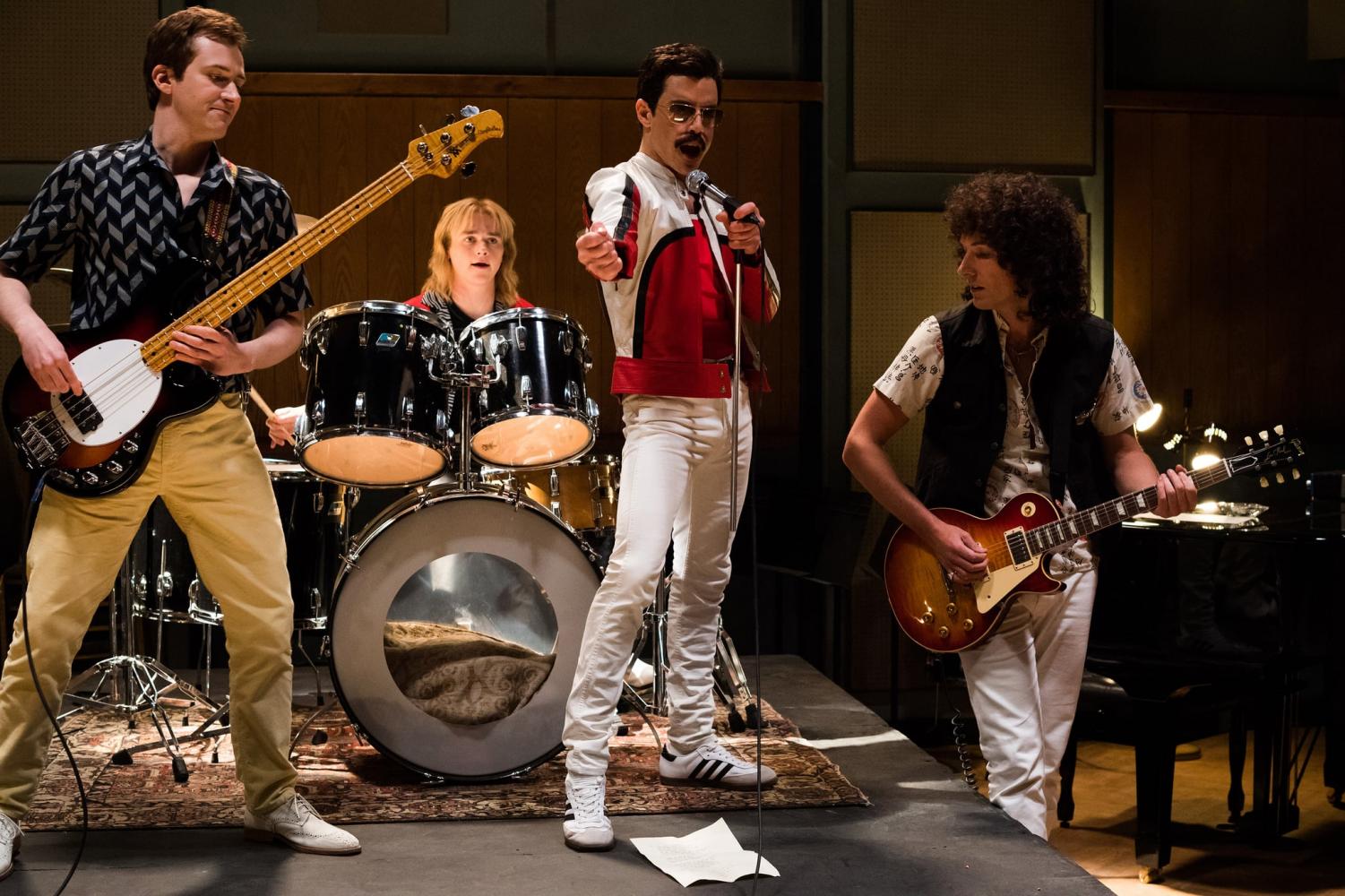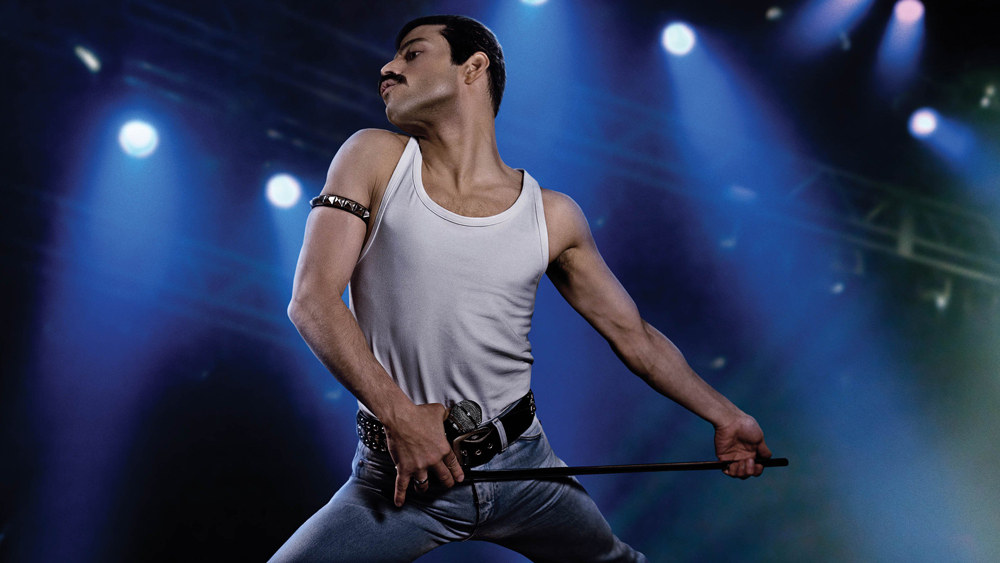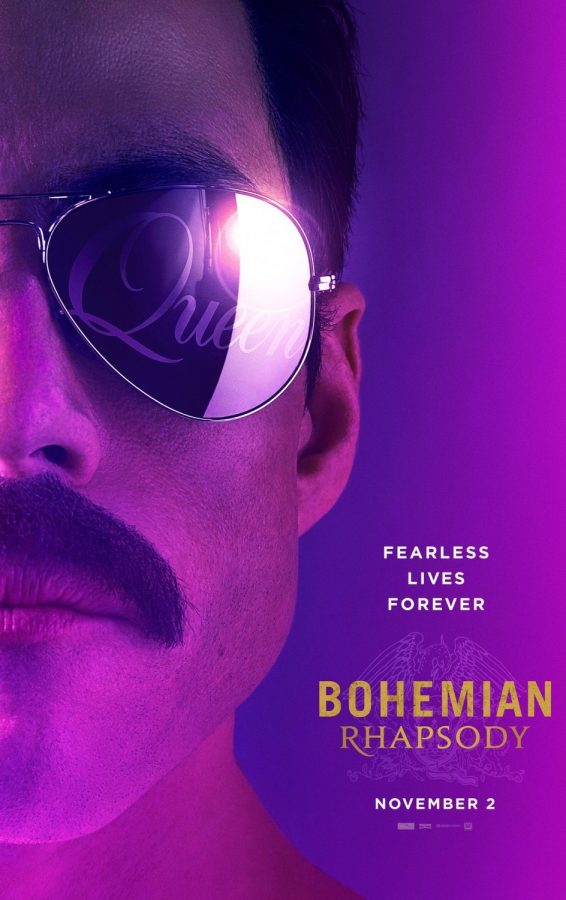Bohemian Rhapsody For Dummies
December 7, 2018
Is it cheating to talk about a movie on a music column? Especially one that just about everyone has been talking about? This past weekend, I finally found the time to pay a visit to the local movie theater, overpriced popcorn in hand and a purse full of candy from CVS snuck in over my shoulder. With last month marking the 27-year anniversary of effervescent lead singer Freddie Mercury’s untimely death, and last week marking World AIDS Day, it seemed like an appropriate time to revisit the masterpiece that is Queen’s abridged discography in an hour and 45 minutes. And I’m really, really glad that I did.
I’ll be the first to admit that I’m not a big fan of movies. I’ve never seen Titanic, Clueless, The Breakfast Club…you get the idea. Flash forward to a few nights ago, though, and Bohemian Rhapsody had me– for the first time in my life– leaving the theater in tears. Mercury’s tragic, twisted life was depicted in all its glory– every up and down from Queen’s meteoric rise to fame to his brief and haunting solo career. There was the perfect balance of music and misery, of entropy and empathy– Rami Malek nailed every aspect of the performance from his charisma on stage to his oversized front teeth.
Maybe you’re like me and you don’t have a clue what’s going on in movies unless it’s spelled out reeeaaallly explicitly. Maybe you’re not the world’s biggest Queen fan, but a friend dragged you along to the movie. Hey–let’s be honest, maybe the only song you knew in the entire movie was “We Will Rock You.” Whatever your background knowledge on Queen may be, here’s a quick synopsis of the real-life events and music mirrored in the movie so you can wow your friends with your knowledge during the film.

Queen’s iconic lineup was founded in the late 1960s in London, when an overzealous, passionate student named Farrokh Bulsara (who later assumed the famous pseudonym Freddie Mercury) joined and revamped a project started by guitarist Brian May and drummer Roger Taylor. They recruited John Deacon to play bass, and were playing shows by the early 1970s. Their progressive, like-college-rock-but-better sound combined with Mercury’s songwriting skills was quickly noticed by the titans of the music industry, and by 1973 they had signed a record deal and released a highly praised debut album. They continued this pattern of writing, recording, touring, and spitting out hit records for several years. Several tours around the world exhausted the band members and were not without their fair share of squabbles and scandals, but produced innumerable hits from “Bohemian Rhapsody” to “Somebody to Love.”
The end of the movie was dedicated to the band’s infamous Live Aid performance in 1985, which has been renowned as the defining performance of the show despite Queen’s last-minute addition to the lineup. Live Aid remains the most-watched television event of all time, and one 2005 poll labeled Queen’s performance as “the best rock and roll performance of all time.” One of Mercury’s most powerful notes, sung a capella, even became known as “The Note Heard Round The World.”
Freddie’s tumultuous private life was heavily showcased in Bohemian Rhapsody, most notably his own struggles with sexuality and his complicated relationship with Mary Austin. Austin and Mercury ended their long relationship after the latter revealed his bisexuality to her, yet remained close friends for the rest of their lives– Freddie often called Mary his “only true friend.” He was even named the godfather to her oldest child. Mercury was struggling to come to terms with his bisexuality in the public eye at, and the stigma associated with the AIDS epidemic didn’t help ease his inner demons. Hairdresser Jim Hutton– who was by some accounts Mercury’s partner and by other accounts his husband– was by his bedside when he died in 1991. Freddie publicly revealed his AIDS diagnosis only the day before he passed away due to complications. Queen honored his legacy by releasing the heart-wrenching ballad “No-One But You (Only The Good Die Young).” The Freddie Mercury Tribute Concert at London’s Wembley Stadium in 1992 was televised to over 1.2 billion viewers, raising over £20,000,000 for AIDS charities.

If the 5 minutes you’ve spent scanning this have been enough to convert you into a lifelong Queen fan, they just announced a tour with Adam Lambert assuming the position of lead singer, and it’s stopping in D.C. in late July. Mercury himself may not be gracing the Capital One stage, but it’s still bound to be an incredible show! Tickets are available here.
While you’re clicking on things, make my December playlist the soundtrack to your finals cram sessions:















